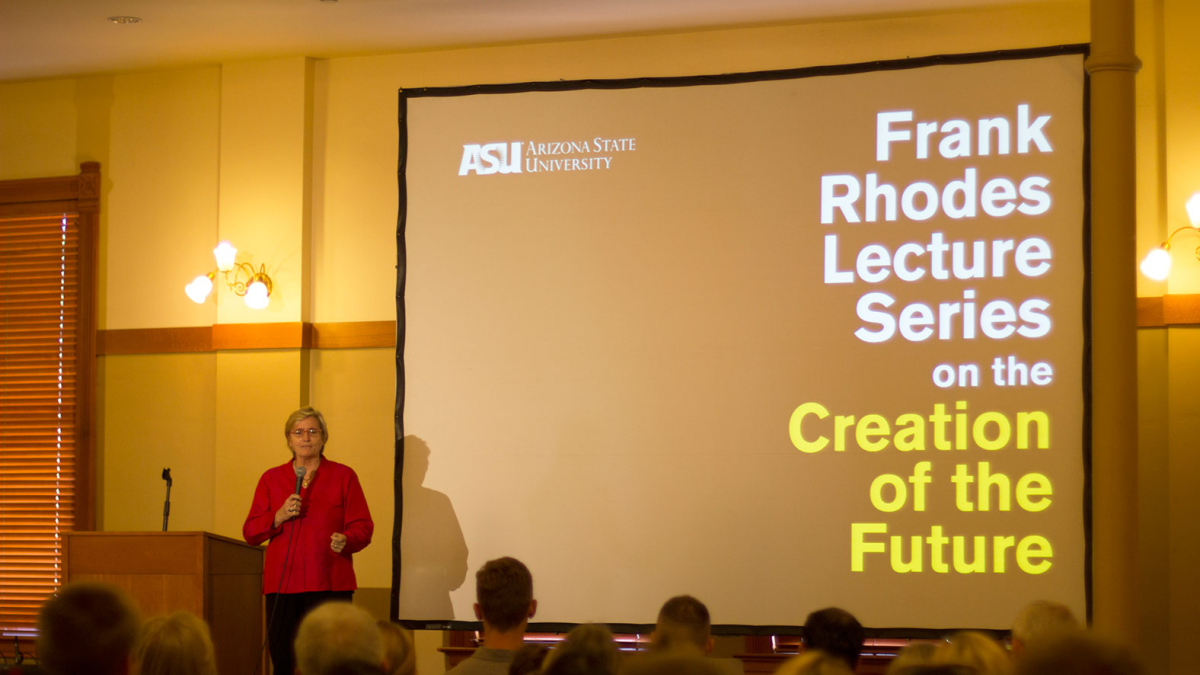Susan Davis delivers Frank Rhodes Lecture

The Frank Rhodes Lecture Series on the Creation of the Future: A Lecture Series for a New American University has brought impactful and transformational leaders and thinkers to share their thoughts with the ASU and wider community each semester since fall 2011.
The series is named after Frank Rhodes, the former president of Cornell University. Rhodes is considered one of the most important university presidents of the 20th century, as a man who consistently underscored the importance of the university while indicating the need for universities to evolve. According to Rhodes, “the distinctive feature of the New American University will still be its commitment to learning in its widest sense.”
On March 26, Susan M. Davis, founder, president and CEO of BRAC USA, joined ASU’s growing legacy of lecturers with a talk about how nurturing entrepreneurship can end global poverty. BRAC USA is a sister organization to BRAC, the largest non-governmental development organization in the world with programs that reach over 126 million people. Davis currently leads BRAC USA, which supports BRAC’s economic development, public health and social development programs all over the world.
To say that Davis is very involved in the world of development and education would be a polite understatement: Davis is a founding board member and immediate past chair of the Grameen Foundation, serves on Ashoka: Innovators for the Public’s international board committee, and serves as senior advisor to New York University’s Reynolds Programme on Social Entrepreneurship. Previously, she co-founded the University Network for Social Entrepreneurship; oversaw Ashoka’s expansion to the Middle East, North Africa and Central Asia; and recently, she co-wrote the book "Social Entrepreneurship: What Everyone Needs to Know" with David Bornstein.
ASU President Michael M. Crow introduced Davis by praising her ability to create results on a grand scale, emphasizing that BRAC takes education and entrepreneurship and brings those services into countries that have ended up in a highly challenging economic situation. “BRAC isn’t about feeding the poor, it’s about creating opportunities, and ASU wants to work on these kinds of social advancement problems,” Crow said.
Davis was warmly welcomed by more than 200 attendees in the Carson Ballroom in Old Main on ASU’s Tempe campus. Her talk focused on creating situations that allow people to help themselves, and on the struggle to promote gender equality in regions that are culturally juxtaposed to the concept. She used the trajectory of her own career path, growing up in Louisiana, applying to Georgetown University on a whim and moving to Bangladesh to demonstrate the immense possibilities available to those who are open to new ideas and willing to take risks.
When it comes to helping others abroad, Davis is the champion of crowdsourcing ideas, resources, and action. When BRAC began, corporate partnerships were almost non-existent, forcing BRAC to compete within the private sector to provide goods and services such as iodized salt to local populations. Eventually, companies saw the profitability in doing good and followed suit. However in recent years, social corporate responsibility has changed dramatically. “From the business side, social entrepreneurship is transforming the nature of business,” affirmed Davis.
After her presentation, she fielded questions from the audience. In response to the dilemma of the ethics of imposing Western values on native populations, Davis’ characteristically pragmatic response was to “work at home, and from afar support indigenous social entrepreneurs in their country. You’ve got to translate a concept, and you need local people to do that. Social enterprise is not invented in America. It’s indigenous.”
Even though the issues she and BRAC focus on are serious, even life-threatening – issues like starvation, or child marriage – Davis remained positive and spirited. She demonstrated a firm belief that anyone can do what she does and be as happy and fulfilled in the process. Her parting words were at once congenial and challenging: “I would defy any of your friends to not think [this] was fun and very cool.”
The Frank Rhodes Lecture Series on the Creation of the Future is sponsored by the Office of the President. Learn more about the Frank Rhodes Lecture Series at http://rhodes.asu.edu.